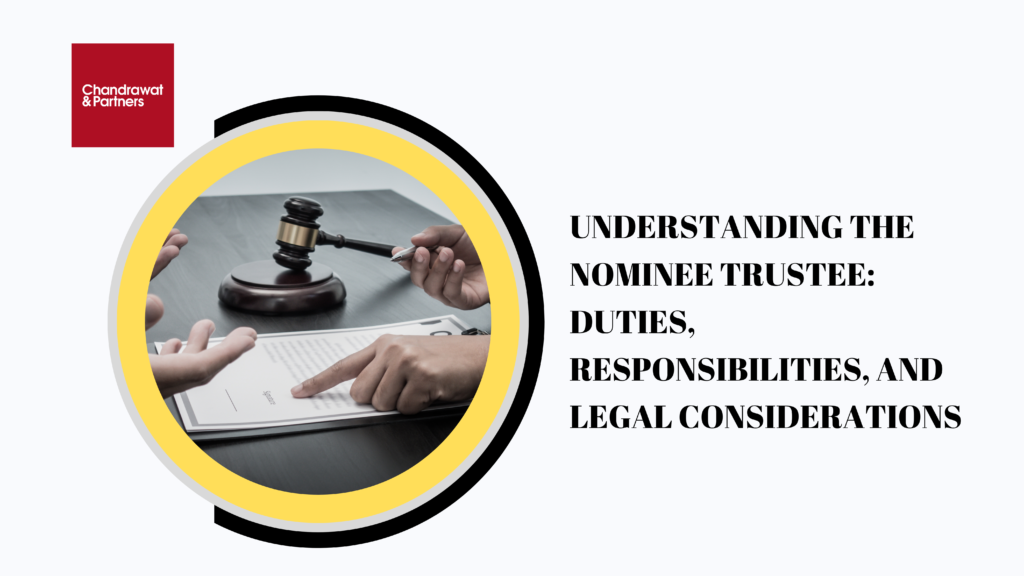Edit Content
Edit Content
Edit Content
Edit Content
Edit Content
Edit Content

The role of a trustee is well-known in the field of trust administration. The nominee trustee is a different kind of trustee that frequently appears in particular circumstances. A nominated trustee is charged with a specific set of obligations, along with important legal obligations.
A nominee trustee, also known as a bare trustee or a passive trustee, is an individual or entity appointed to hold legal title to assets or property on behalf of another party, known as the beneficial owner. An individual or entity authorised to hold legal title to assets or property on behalf of another party (the beneficial owner), is known as a nominee trustee.
The primary responsibility of a nominee trustees’ is to hold assets or other property in trust for beneficiaries, although they may not have full authority or control over those assets. The legal title of the assets is held by the nominated trustee, while the beneficiary continues to have beneficial ownership or control over them.
When a financial company or bank holds money on behalf of a person or organization, as is the case with nominee bank accounts, nominee trustees are frequently employed in various financial and legal arrangements. The name of the nominee trustee is just used for administrative purposes; the beneficial owner is the one who actually owns or controls the assets.
Nominee trustees don’t have the same authority or influence over the funds or property they hold, which an ordinary trustee enjoys. Instead, they act as custodians, ensuring the legal ownership is separate from beneficial ownership.
Using a nominee trustee is frequently used to accomplish a particular objective, such as protecting assets, maintaining privacy, or simplifying complicated transactions. The beneficial owner can maintain their anonymity and privacy while still enjoying the advantages of ownership by having a different legal owner in the form of a nominee trustee.
Although the function of the nominated trustee may appear uncomplicated, it still has a number of significant obligations. Here are the primary responsibilities of a nominee trustee:
Both the nominee trustee and the beneficial owner must be aware of the legal aspects of nominee trustees. Here are some important legal considerations to keep in mind:
Nominee trustees have a unique position in trust administration, operating as legal title holders but having limited authority over assets or property. Understanding their obligations, responsibilities, and legal issues is critical for both nominee trustees and beneficial owners. Individuals who understand the complexity of the nominee trustee role can negotiate the complexities of trust arrangements more effectively and ensure the seamless and compliant management of assets or property. Properly executed nominee trustee arrangements can give benefits such as privacy, asset protection, and strategic flexibility, but it is critical to get competent assistance and produce clear documentation to ensure legal compliance and safeguard the interests of all parties involved.
For more information or queries, please email us at
enquiries@chandrawatpartners.com

Managing Partner
Chandrawat & Partners is a prominent full-service firm dedicated to delivering top-tier professional services to clients both within the domestic and international spheres.
Copyright © Chandrawat & Partners. All Rights Reserved.
Copyright © Chandrawat & Partners. All Rights Reserved.

Chandrawat & Partners stands as a dynamic and rapidly expanding full-service firm, specializing in the delivery of exceptional professional and corporate services to a diverse clientele, both foreign and local. We proudly represent companies and individuals across a wide spectrum of sectors through distinct entities established in various countries worldwide.
Chandrawat & Partners stands as a dynamic and rapidly expanding full-service firm, specializing in the delivery of exceptional professional and corporate services to a diverse clientele, both foreign and local. We proudly represent companies and individuals across a wide spectrum of sectors through distinct entities established in various countries worldwide.
ASIA
AFRICA
EUROPE
NORTH AMERICA
SOUTH AMERICA
OCEANIA